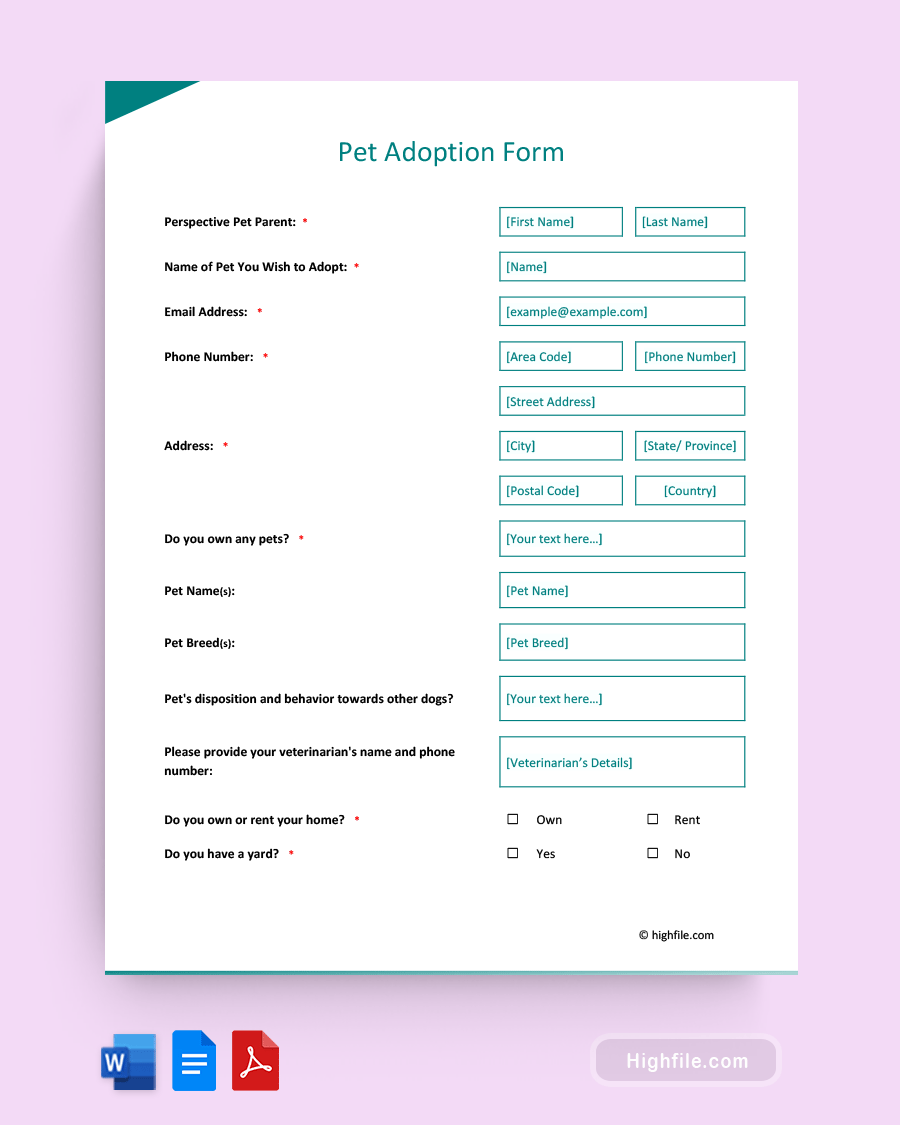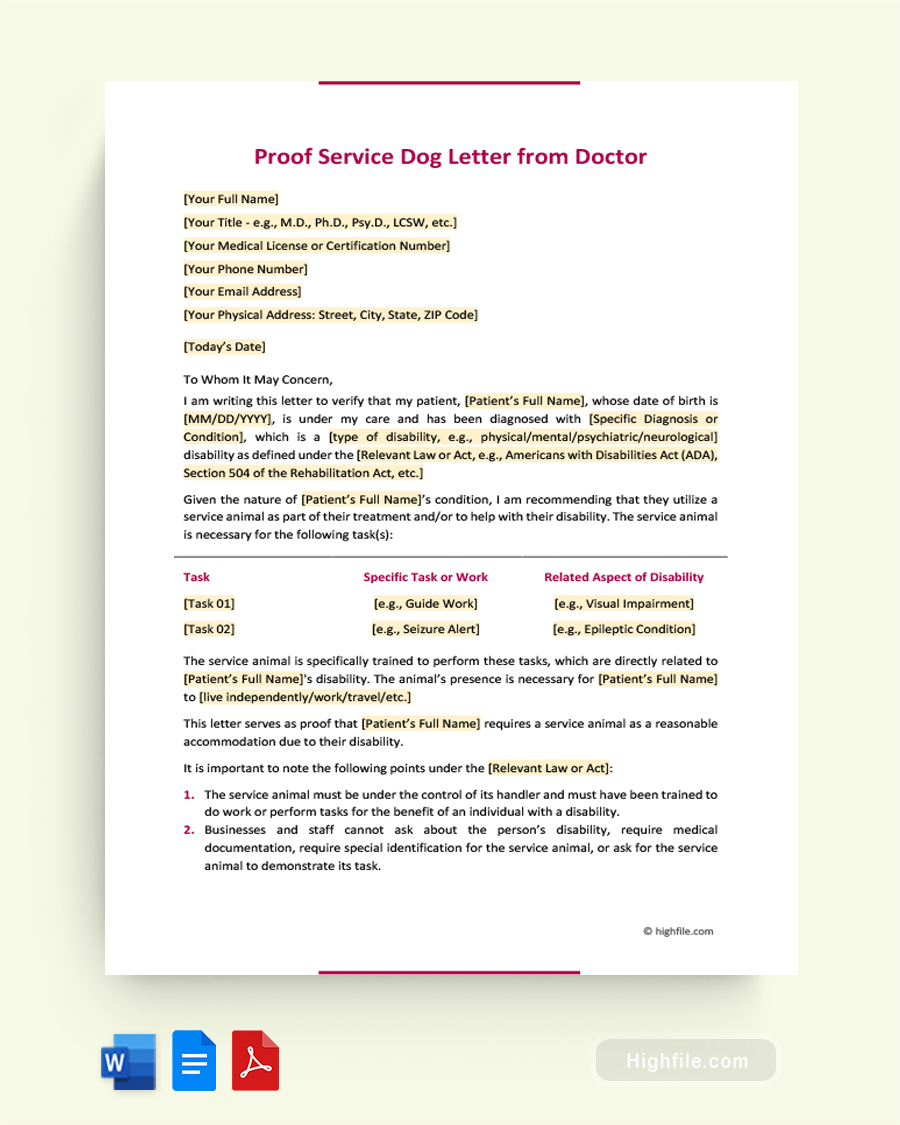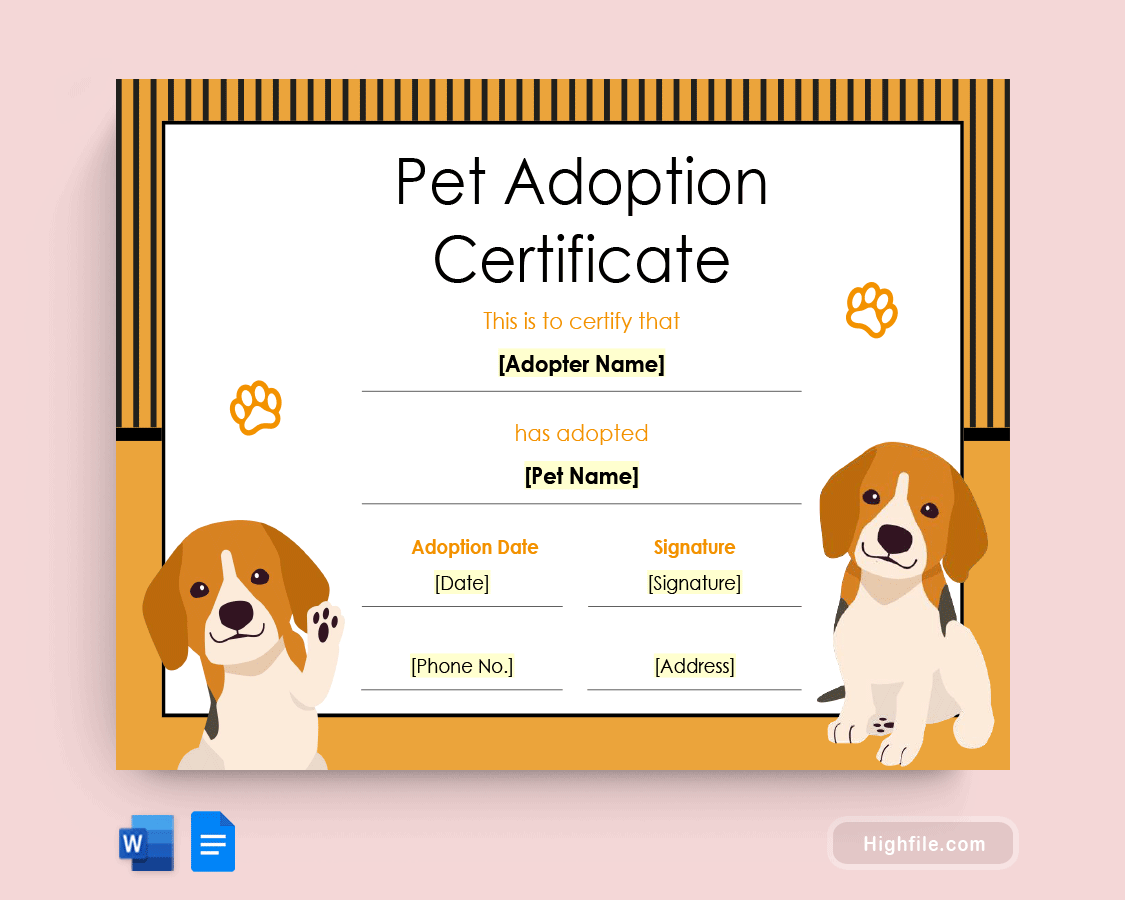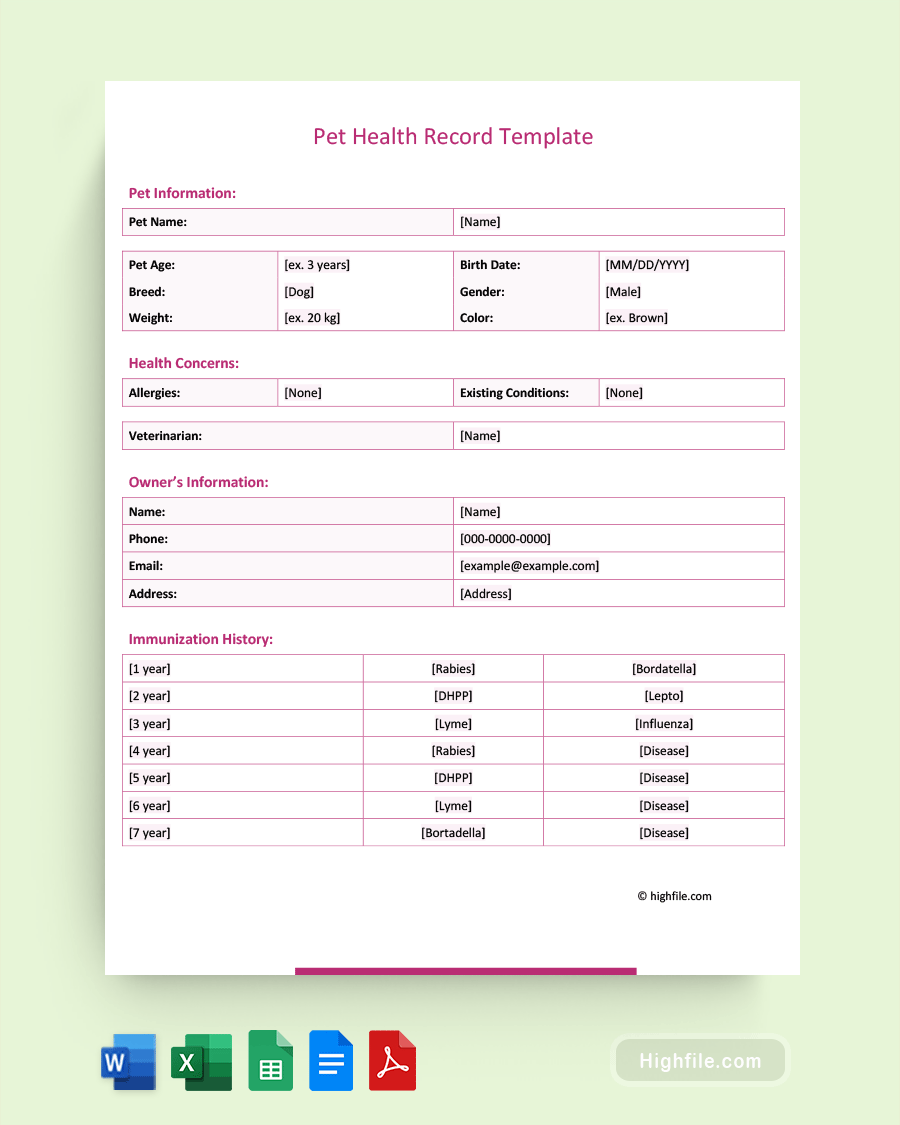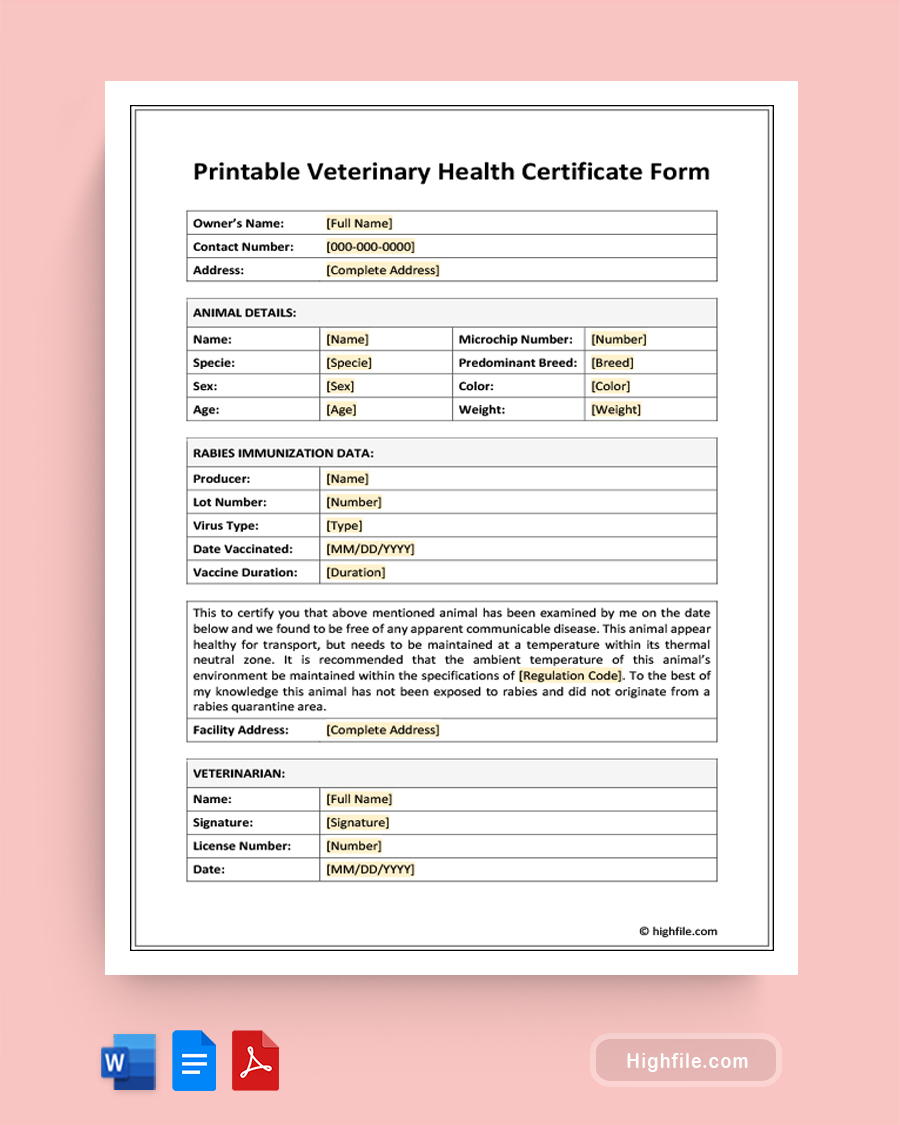A high-quality pet adoption form is essential for any organization that works with rescued or surrendered animals, as it helps to ensure the safety and well-being of the animals in their care. The form should provide detailed information about the potential adopter, including their background, lifestyle, and financial situation. It should also include questions about the adopter’s experience with animals, their expectations for an adopted pet, and their willingness to commit long-term. Using our professionally created pet adoption form template will ensure your organization gets all the information it needs to vet potential pet owners and offer your animals the best chance at long, happy lives in their new forever homes.
What Is a Pet Adoption Form?
A pet adoption form is a document that animal shelters and other pet adoption organizations use to collect information from potential adopters. It typically includes questions about the adopter’s contact information, lifestyle, and experience with pets. It may also include questions about the adopter’s financial situation and ability to provide for the pet. The form is used to assess whether the adopter is a suitable candidate for pet ownership.
Why Is a Pet Adoption Form Necessary?
A pet adoption form is necessary to ensure the right pet is placed in the right home. The document provides valuable information about the adopter, allowing the adoption agency or shelter to determine that the prospective adopter is suitable for the pet and can provide a safe and loving home for their new companion. The form also provides an opportunity for the adoption agency or shelter to gather information about the adopter’s lifestyle, living arrangements, financial situation, and experience with animals. This helps ensure the pet is placed in a secure and appropriate environment. Additionally, a pet adoption form helps to protect both the animal and the adoption agency.
What Information to Provide and Collect Along with the Pet Adoption Form
People seeking to adopt from your agency should have a good understanding of the type of pet you would like to adopt. Remind them to consider the breed, size, age, sex, and personality traits they are looking for in a pet. Remind them to research the type of pet’s medical history and any potential health issues that might arise. Adoption depends on available animals, so they will need to be flexible in their choices. Providing basic pamphlets about what questions to ask yourself or how to find a pet that suits your lifestyle is a great way to improve the adoption experience.
Families and individuals looking to adopt should be prepared to provide information about themselves. You will need to collect enough details to make a decision about whether they are a good fit for your animals and how capable they are of providing a positive, loving home. Have them fill out questionnaires that include details such as how much yard space they have, how active their lifestyle is, do they have a lot of guests, or are they more solitary. There’s nothing wrong with having no yard or preferring to stay in and watch TV, but that’s definitely a better fit for a cat or a pug than it is for a high-energy herding dog. Try to steer people toward animals who commonly share their lifestyle so everyone, especially the animals, will be happy with the adoption.
Essential Elements of Pet Adoption Form
The essential elements of a pet adoption form vary significantly from one organization to the next, but some information is standard. For example, the person adopting an animal always include their contact information and answers questions about the home the pet will be living in. Below we’ve created an outline of the essential elements and why they are important.
- Organization Name and Logo- This tells people whose form it is and is standard practice.
- Form Title- Your form title says what the document is for, so it should read ‘Pet Adoption Form’ in large, bold print at the top of the page.
- Potential Owner/Applicant Name- Have the applicant print their full legal name here.
- Name of Pet Being Adopted- Pets in shelters and rescues are usually given names because it helps identify them, so put the animal’s name here, even if the adoptive parents plan to change it later.
- Applicant Contact Information- Address, phone number, and email
- Other Household Pets Information and Questions- Ask about other pets in the house, what type, breed, and age, how they react around other animals, and so forth.
- Veterinarian Information- Potential pet owners need to have a local vet chosen.
- References- Have the applicant list three references with phone numbers, just as they would on a job application.
- Home Information- These are questions about yard space, home ownership, landlord permission for animals, whether the applicant has children, and other relevant information.
- Pet Environment Questions- Ask how often the pet will be alone, whether the owner believes in crate training, etc.
- Pet Behavior Questions- Inquire about how the applicant plans to deal with behavior issues if they crop up and how they plan to train their new pet.
- Pet Emergency Questions- Have the applicant answer briefly how they’ll deal with emergencies.
- Pet Surrender and Owner Criminal History Questions- Has the applicant ever surrendered a pet or been involved in any crime related to or involving animals?
- Statements of Assent- The assent statements are what the applicant is agreeing to and should cover any liability waivers, commitment to care for the animal, to return it to your agency if surrender is necessary, telling the truth on the application, and anything else they must consent to before signing and returning the form.
- Signature and Date Lines- The signature and date turn this paper into a legally binding contract.
FAQs
Asking questions is a critical part of the adoption process. To help you compose the best pet adoption form possible, we’ve answered the most frequently asked questions from people seeking to learn more about these documents or the process. You’ll find information on adopting versus buying, why adoption is cost-effective, and what to consider before adopting, among other vital facts.
Pet adoption is important for a variety of reasons. For owners, pet adoption provides an excellent opportunity to bond with animals in need of a loving home. Cat and dog owners can provide a safe, happy home for a pet and experience the joys of owning a companion animal uniquely suited to their lifestyle. Pet adoption reduces pet homelessness and overpopulation and gives owners the satisfaction of knowing their new pet has been saved from a potentially dangerous situation. For the animals themselves, adoption offers them the opportunity to live in a safe and secure environment with people who are properly prepared and capable of giving them the care and love they need.
A rescued pet is a term used to describe an animal taken in and cared for by an animal rescue organization or individual. These animals are typically homeless, neglected, abused, or abandoned and in need of a loving home. Rescue organizations work hard to provide these animals with medical care, food, shelter, and love until they can find a permanent home. Many rescue organizations also work to educate the public on responsible pet ownership and the importance of spaying and neutering pets.
Adopting a pet is a big decision that should not be taken lightly. Before taking the plunge, there are several important factors to consider. First, you should consider the pet type that would best fit your lifestyle. Different animals have different needs, and you must ensure you can provide for the pet’s needs before bringing them home. For example, a large dog may not be the best choice if you live in an apartment. Second, you should consider the cost of owning a pet. Pets require food, toys, and veterinary care. Finally, consider your time and space. Can you handle the long-term commitment it requires to care for this animal?
Adopting a pet is not the same as buying one. When you adopt a pet, you are taking on the responsibility of giving a forever home to a pet that has been neglected, unwanted or abused. You can only adopt available pets. On the other hand, buying a pet involves selecting an animal from a breeder or pet store, making an immediate purchase, or asking a breeder to hold an animal for you from a future litter. While this may give you more control over the type of animal you get, it also supports puppy mills and other unscrupulous breeding practices.
Adopting a pet is typically cheaper than buying one from a breeder or pet store because many shelters and rescue groups have lower adoption fees. Spaying and neutering animals are often included in the adoption fee, and most pets have had extensive health checkups before adoption. Some shelters provide pet accessories like collars or favorite toys with the adoption. Lastly, many rescue animals have already been trained or are young enough to learn quickly, thus saving money on professional training.
Pet adoption is an incredibly impactful and beneficial decision, both for pets and humans. By adopting a pet, people can give a homeless animal a safe and loving home, providing companionship, medical care, and plenty of playtime. For humans, pet adoption also offers a range of benefits that can have lasting positive effects on their mental and physical health. First and foremost, adopting a pet means you will receive unconditional love and companionship from your four-legged friend. This strong bond between pet owner and fur baby is invaluable, providing daily emotional support, comfort, and a deep connection.
Final Thoughts
A pet adoption form is necessary for the adoption process to help ensure responsible pet ownership. This vital document helps animal welfare organizations determine the ability of an individual or family to provide a safe, secure, and humane home for an animal. It asks specific questions about the adopter’s current living situation, lifestyle, and previous experience with pets. This helps the organization evaluate the home environment and determine if a particular pet is the best fit. In addition, the form also collects important contact information in case questions arise or if further contact is necessary with the adopter in the future. Choosing a professionally designed pet adoption template helps your organization concisely and efficiently collect the information you need.
